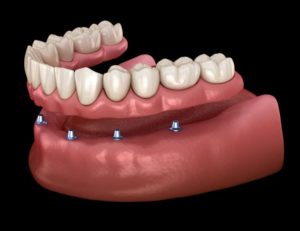 It’s estimated that around 40 million Americans have lost all their teeth, most of which wear dentures to restore the function and appearance of their smile. But while dentures bring back your ability to eat, speak and smile comfortably, they don’t last forever. Not to mention that you begin to slowly but surely lose density in your jawbone over time, causing them to become loose and ill-fitting. Fortunately, there are outstanding solutions that will help your dentures in Columbia feel and function better than ever. Keep reading to learn more!
It’s estimated that around 40 million Americans have lost all their teeth, most of which wear dentures to restore the function and appearance of their smile. But while dentures bring back your ability to eat, speak and smile comfortably, they don’t last forever. Not to mention that you begin to slowly but surely lose density in your jawbone over time, causing them to become loose and ill-fitting. Fortunately, there are outstanding solutions that will help your dentures in Columbia feel and function better than ever. Keep reading to learn more!
How Long Do Dentures Last and When Do You Need A New Set?
On average, dentures need to be replaced an average of every 5-8 years. Here are some signs that tell you they need to be repaired or replaced:
- The base of your denture starts to “give” – Due to wear-and-tear or simply the pressure of chewing each day, the pink base of your denture may start to give or feel weaker than it once did.
- Your denture is damaged – If a denture is dropped or otherwise damaged, it can easily chip or break, weakening the whole appliance and making it more susceptible to breaking again.
- Your denture feels loose or starts to slip – If your denture begins shifting or slipping during meals or conversations, it can benefit from a re-line to restore its initial fit or a more permanent solution such as dental implants.
How Can You Improve Your Dentures?
You can temporarily improve a denture with either a rebase to repair the base alone or a reline to restore its snug fit. For a more permanent fix, dental implants are a fantastic choice.
An implant-retained denture provides multiple benefits that you can’t get from a traditional denture such as:
- Implants take the place of the roots of missing teeth, which “tricks” your body into preserving your jawbone. This, in turn, helps maintain your facial structure and youthful appearance after tooth loss.
- Implants help your dentures feel and function more like your own teeth.
- Your dentures will also last longer than they would otherwise.
- With a significantly better fit, you won’t have to worry about embarrassing slips in social situations, giving you more self-confidence.
- You won’t need nearly as much dental adhesive (or none at all).
If you’re concerned that implants won’t work because you’ve lost too much jawbone after tooth loss, mini-implants may be a great option. These smaller, shorter implants are often a possibility for patients who were previously told they weren’t candidates for the procedure.
If you’d like to know if implant dentures are right for you, start by scheduling a consultation. After taking this first step, you’ll be well on your way to having a denture that fits better than ever.
About the Author
Dr. Matthew Hart is a family dentist who graduated from the University of Tennessee School of Dentistry in 2008. He knows how important it is for dentures to fit and function well and offers several solutions to help his patients get the most from their appliances. If your dentures in Columbia don’t feel as great as they once did and you have any questions, he can be reached via his website.


